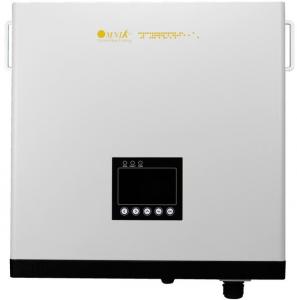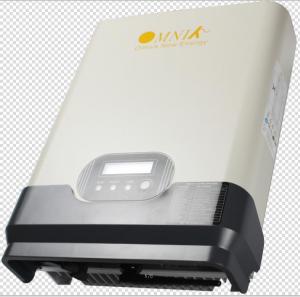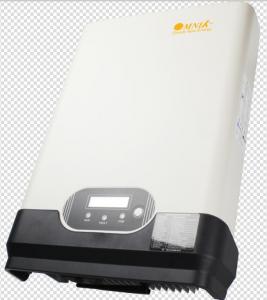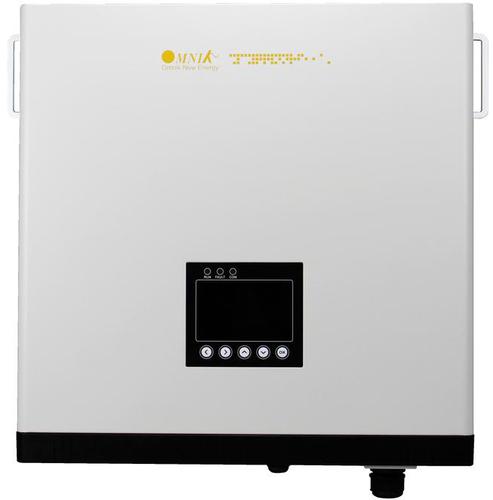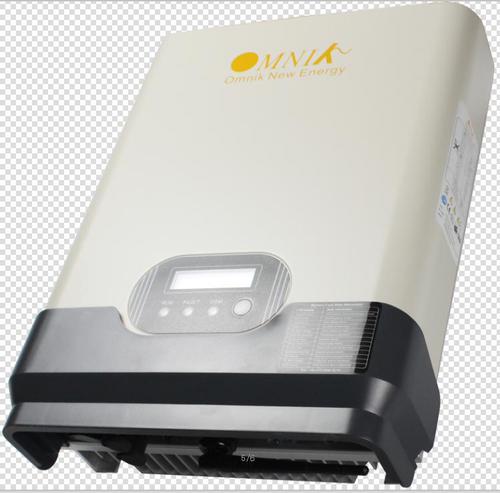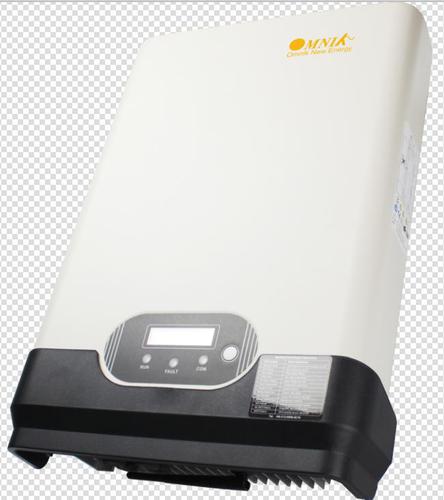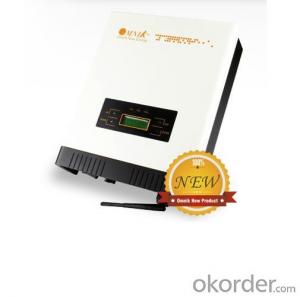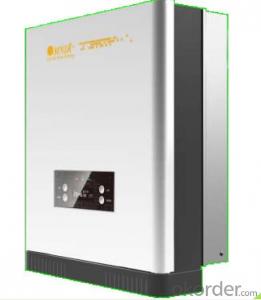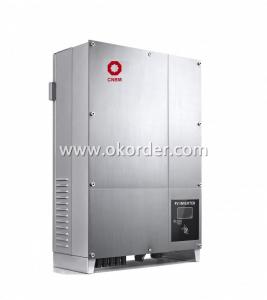Livguard Solar Inverter Omniksol-1.5k-TL
- Loading Port:
- Shanghai
- Payment Terms:
- TT OR LC
- Min Order Qty:
- -
- Supply Capability:
- 3000 pc/month
OKorder Service Pledge
OKorder Financial Service
You Might Also Like
Omnik new energy solar inverter
Omniksol-2.0k-TL Photon Efficiency up to 3kW
in the world------ Photon tested Jan. 2012.
Omniksol-1.5k-TL
Futures
Transformerless design, high efficiency (Max.97.5%,Euro.96.6%)
High MPPT accuracy(>99.9%)
Wide DC input range(120-500 Vdc), compatible with different module technologies
Easy to wire, install and operate
IP 65 design, suitable for indoor and outdoor installation
5 years warranty(10~25 years as option)
technical data:
Type | Omniksol-1.0k-TL | Omniksol-1.5k-TL | Omniksol-2.0k-TL |
Max. PV-Generator Power [W] | 1300 | 1750 | 2300 |
Max. DC voltage [V] | 500 | 500 | 500 |
MPPT DC voltage Range [V] | 80-300 | 120 - 450 | 120 - 450 |
Turn off DC voltage [V] | 80 | 120 | 120 |
Max. DC Current [A] | 16 | 18 | 18 |
Nominal DC Current [A] | 8.5 | 14 | 16 |
Number of DC Connection | 1 | 1 | 1 |
DC-Connection | MC4 | MC4 | MC4 |
Number of MPP trackers Turn on Power [W] | 1 | 1 | 1 |
Turn on power(W) | 10 | 10 | 10 |
- Q: Can a solar inverter be used with a solar-powered air conditioner?
- Yes, a solar inverter can be used with a solar-powered air conditioner. A solar inverter is responsible for converting the direct current (DC) electricity generated by solar panels into alternating current (AC) electricity that can be used to power appliances. In the case of a solar-powered air conditioner, the solar inverter would be essential for converting the DC electricity generated by the solar panels into AC electricity to run the air conditioner.
- Q: Can a solar inverter be used for both single-phase and three-phase applications?
- No, a solar inverter cannot be used for both single-phase and three-phase applications. Different types of inverters are designed specifically for either single-phase or three-phase systems, as they have different voltage and power requirements.
- Q: Can a solar inverter be used with a solar-powered greenhouse system?
- Yes, a solar inverter can be used with a solar-powered greenhouse system. A solar inverter converts the direct current (DC) produced by solar panels into alternating current (AC) that can be used to power electrical devices. In a solar-powered greenhouse system, solar panels generate electricity from the sun's energy, which is then converted by the inverter to power the various components of the greenhouse, such as fans, lights, and irrigation systems.
- Q: How does a solar inverter convert DC power into AC power?
- A solar inverter converts DC power into AC power through a two-step process. Firstly, it uses a semiconductor component called a power switch to chop the DC input voltage into small pulses. Then, it employs a filter to smooth out these pulses, transforming them into a continuous waveform, which is the desired AC output power. This conversion enables the solar inverter to supply electricity that is compatible with standard AC appliances and can be used in homes, businesses, and the electrical grid.
- Q: What is the maximum DC input current of a solar inverter?
- The maximum DC input current of a solar inverter depends on its specifications and design. It can vary greatly depending on the model and capacity of the inverter. It is essential to refer to the manufacturer's documentation or specifications to determine the specific maximum DC input current for a particular solar inverter.
- Q: What is the role of a solar inverter in reactive power compensation during grid disturbances?
- The role of a solar inverter in reactive power compensation during grid disturbances is to regulate and manage the reactive power flow between the solar panel system and the grid. During grid disturbances, such as voltage fluctuations or power factor variations, the solar inverter helps maintain a stable and balanced flow of reactive power, ensuring efficient and reliable operation of the solar panel system while minimizing the impact on the grid.
- Q: Can a solar inverter be used with solar concentrators?
- Yes, a solar inverter can be used with solar concentrators. Solar concentrators focus sunlight onto a smaller area, increasing its intensity. The concentrated solar energy can then be converted into electricity by a solar inverter, just like with traditional solar panels.
- Q: Can a solar inverter be used in locations with high humidity or extreme temperatures?
- Yes, solar inverters are designed to withstand high humidity and extreme temperatures. They are built with robust materials and protective coatings to ensure reliable operation in various environmental conditions. Additionally, many solar inverters undergo extensive testing and are certified to meet industry standards for performance and durability in challenging climates.
- Q: What are the key factors affecting the compatibility of a solar inverter with other system components?
- The key factors affecting the compatibility of a solar inverter with other system components include the power rating and voltage compatibility of the inverter with the solar panels, batteries, and electrical grid, as well as the communication protocols and interconnectivity requirements between the inverter and other system components. Additionally, the inverter's efficiency, protection features, and overall design should be considered to ensure seamless integration and optimal performance of the entire solar power system.
- Q: Can a solar inverter be used in a commercial or industrial setting?
- Yes, a solar inverter can be used in a commercial or industrial setting. In fact, they are commonly used in these settings to convert the direct current (DC) electricity generated by solar panels into alternating current (AC) electricity that can be used to power various commercial and industrial equipment. Solar inverters are essential components of solar power systems in such settings and play a crucial role in maximizing energy efficiency and reducing reliance on conventional power sources.
Send your message to us
Livguard Solar Inverter Omniksol-1.5k-TL
- Loading Port:
- Shanghai
- Payment Terms:
- TT OR LC
- Min Order Qty:
- -
- Supply Capability:
- 3000 pc/month
OKorder Service Pledge
OKorder Financial Service
Similar products
Hot products
Hot Searches
Related keywords
